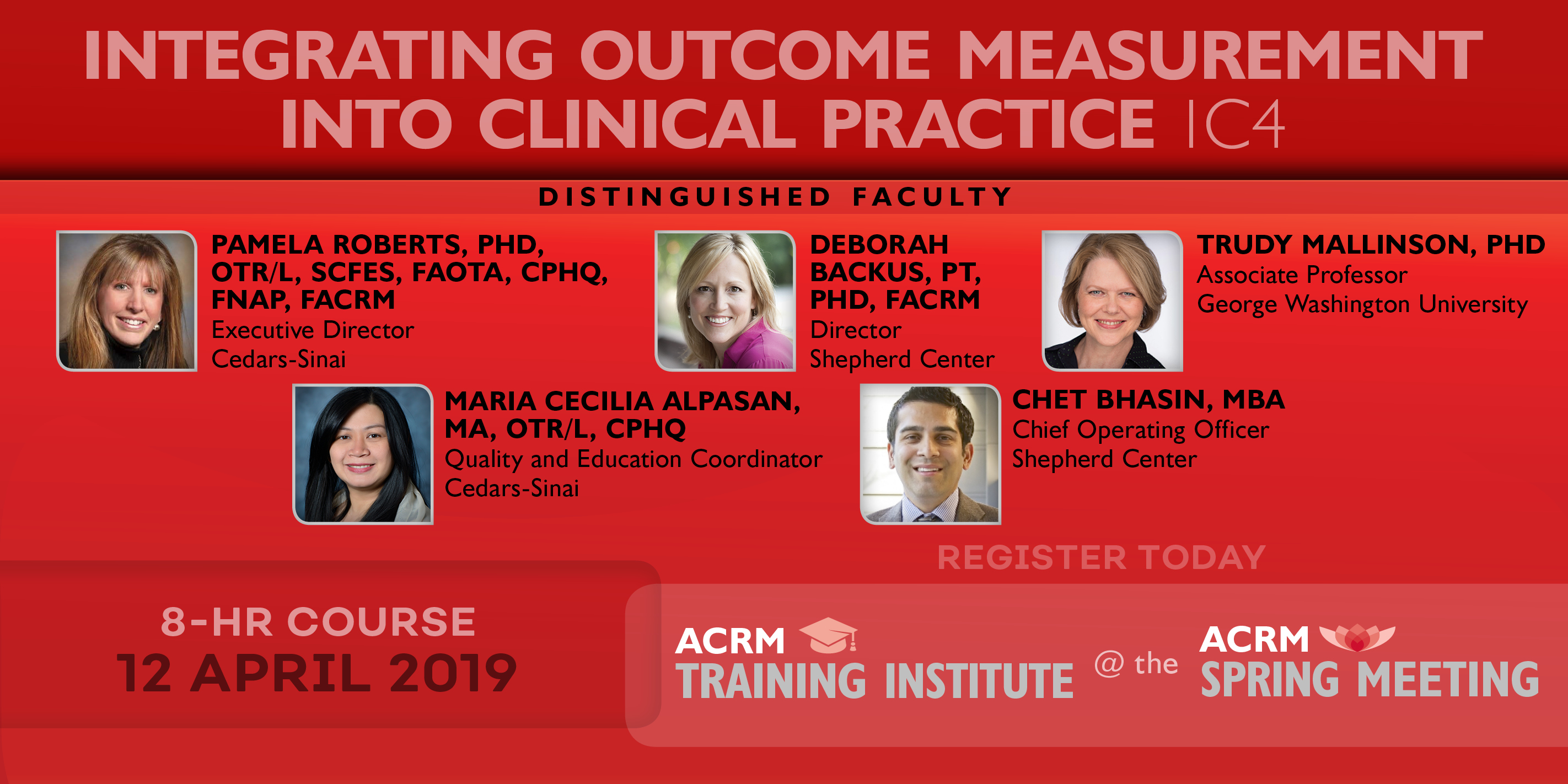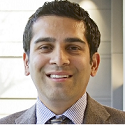PRESENTER

Integrating Outcome Measurement into Clinical Practice IC4
PRESENTER
DAY Friday 12 April 2019
TIME 9:00 AM – 6:00 PM (Lunchbreak 1:00 PM – 2:00PM)
FORMAT 8-hours instructional course, Other – Lecture
ROOM 4F
TOPIC AREAS Cross-Cutting, Clinical Practice (assessment, diagnosis, treatment, knowledge translation/EBP, implementation science, program development)
CAREER LEVEL Intermediate
WHO SHOULD ATTEND
All type of therapists, Administrators
Course Description
The concept of quality is not new, but the language related to quality including quality model initiatives have evolved. Health care reform mandates are impacting rehabilitation providers. Physical, occupational and speech language pathologists, psychologists, nurses and physiatrists are amongst those who need to demonstrate their value in an increasingly competitive health care market. Furthermore, there is a critical need to grow the rehabilitation evidence base in to advance clinical care for people with disabilities.
Provision of the quality rehabilitation to meaningfully contribute to the evidence base, providers need to measure outcomes. Despite the awareness of need, less than half of rehabilitation providers actually utilize outcome measures routinely in practice. Jette et al1. demonstrated that only about 48% of surveyed PTs indicated that they use standardized outcome measures. The barriers include lack of knowledge, time and resources for identifying and implementing the routine collection of outcomes in the clinical setting.
Reporting federally mandated outcome measures is a reality for rehabilitation providers. Consequently, rehabilitation clinicians can and should develop the practice of collecting outcomes. This will include condition-specific measures in addition to federally-mandated global measures. Examples may include outcome assessment for mitigating safety risks, interventions, etc. Understanding the rationale and importance of regularly and systematically using outcome measurement to inform clinical practice will not only provide data to help demonstrate value, but should also ultimately lead to improved patient outcomes.
There are numerous rehabilitation outcome measures and scales and determining which to use is challenging. Some are appropriate for a wide range of diagnostic groups and others are more disease-specific. Knowing which factors are important for selecting the right outcomes measures for the right patients is important for ensuring data are reliable, valid, and clinically useful. Resources for locating and obtaining tools are important for ensuring use of outcomes assessment becomes a routine part of clinical practice.
Finally, outcome measurement is important for demonstrating value, increasing and advancing clinical knowledge. This provides clinicians with clinical knowledge and patient-related outcome information that is intelligently filtered and synthesized at appropriate times to enhance patient care. Automatic provision of decision support as part of the provider’s workflow may lead to effective and efficient patient outcomes.
The purpose of this instructional course is to provide rehabilitation providers the rationale and guidelines for choosing outcomes to use routinely in clinical settings. A framework will be provided to guide the choice of outcomes, including tools to assist in this endeavor. Considerations for choosing outcomes will be discussed from a management perspective specifically related to use of outcome measures as benchmarks for process improvement and quality of care. Regardless of setting, evolution from data to knowledge requires integration of outcomes measures in meaningful ways to inform decisions about care.
Case studies and group activities will assist the participant in cultivating an analytic mindset for developing an outcome framework. This presentation will focus on interdisciplinary examples from sources that can enhance decision making and improve patient outcomes and address current use, barriers and facilitators for implementation of standardized measures.
LEARNING OBJECTIVES
Upon completion of the course, participants should be able to:
- Recognize the value and importance of outcome assessments in routine clinical practice of using classification schemes
- Determine outcome assessment selection including interpretation of measurement properties
- Evaluate, interpret and discuss strategies for integration of outcome assessments into clinical practice
- Increase awareness of how discrete data can be synthesized into knowledge to expedite patient care.
CME/CEUS 8 Hours
ACRM Training Institute registration includes CME/CEUs for the following disciplines:
- Case Managers (CCMC)
- Disability Management Specialists (CDMS)
- Healthcare Executives (ACHE)
- Nurses (ANCC)
- Occupational Therapists (AOTA)
- Physical Therapists (FSBPT-24 states)
- Physicians (ACCME-CME)
- Psychologists (APA Division 22)
- Rehabilitation Counselors (CRCC)
- Social Workers (NASW)
- Speech Therapists (ASHA)
REGISTRATION INCLUDES
8 hours of live instruction, continuing education credit processing, access to presentation slides (if provided by presenters), NON-ACRM members receive introductory 6- month membership.
COST
Early Bird rate $99 for members and $149 for non-members and that includes CME / CEU processing. See the rate tables here.
We encourage you to register early before tickets are gone. Don’t say we didn’t warn you.
Limited space available
The secret sauce for your career
Discounted for ACRM members, the ACRM Spring Meeting offers instructional courses with continuing education credits in your choice of up to 11 disciplines.
Jump in, get involved, meet and work with ACRM members face-to-face in a casual setting. This event is all about getting research into practice in a supercharged atmosphere and a friendly, collaborative, and inspiring environment.
Up to 20 HOURS AVAILABLE in 11 DISCIPLINES
The ACRM Spring Meeting is a venue for face-to-face collaborating of many interdisciplinary ACRM community groups and committees — the heart of ACRM. Come find your tribe and become a member of the vibrant ACRM community.
BEST VALUE
Ridiculously inexpensive? Yep. That’s because we believe in getting the research to practice ASAP. And we think that having a low-cost to attend is a good way to do that.
Early Bird rates are as low as $49 for members and $99 for non-members — and that includes CME / CEU processing. Are you kidding me?!? Nope. See the rate tables here.
We encourage you to register early — before tickets are gone. Don’t say we didn’t warn you.
WHO ATTENDS
You’re our people
ACRM attendees are all kinds of rehabilitation professionals — from researchers to clinicians (including
doctors, nurses, PT assistants, hospital administrators to name just a few) to consumers, family, caregivers, and
more. Everyone is invited and warmly welcomed at ACRM.
They span a wide spectrum of experience from students to well-seasoned pros and hail from the largest
rehabilitation institutions and universities to one-person solopreneurs.
Attendees at previous ACRM events include designers, art directors, and production staff from hundreds of
institutions, companies, and universities from all around the world, including:
VENUE HILTON CHICAGO
TOP REASONS to STAY at ACRM HEADQUARTERS HOTEL
This place is beautiful. The Hilton Chicago is the optimum headquarters with superb onsite amenities + easy access to the best of Chicago.
- SAVE TIME — staying right in the ACTION the ultimate venue for efficient collaboration
- SAVE MONEY — book your room through ACRM and SAVE
- CONVENIENCE — you are only an elevator ride away from courses and meeting and located right on the famed Michigan avenue — smack in the middle of city hotspots — Grant Park, museums, Navy Pier, and more


- HEALTH CLUB — on the 8th floor, it’s the largest hotel gym in Chicago with indoor pool and hot tub an indoor running track, strength training and cardio equipment, Synergy 360, and sundeck with views of the Chicago skyline.
- HHONORS Club — join the Hilton Honors through the ACRM Fast Track to GOLD program and get EXTRA points and all the cool member benefits including digital check-in.
- Get the HHONORS APP — TIP: It’s really VERY handy
BOOK NOW to enjoy the SAVINGS and CONVENIENCE of staying on-site at the headquarters hotel.
Or book Hilton by phone: +1.877.865.5320
with Booking Code: ACR to ensure the lowest rates
(Code: ACT for Government booking)
Space is limited. So lock in your seat and REGISTER TODAY >>







